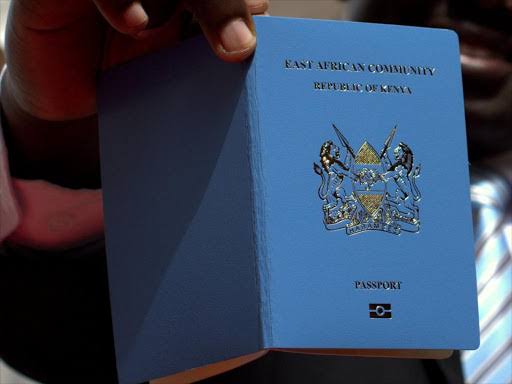

Kenya's passport strength ranking has dropped two steps globally from 67 to 69 in 2024, with only 71 visa-free entries in the latest Henley
Passport Index.
Although it improved six steps last year from its previous position of 73, the country’s passport has lost almost 20 positions over the past 20 years, dropping from position 51 in 2005.
It ranked lowest at position 77 globally in 2021 following Covid-19 pandemic.
Apart from visa-free entry to East Africa Community (EAC) member states including Uganda, Tanzania, Rwanda, Burundi, DR Congo and South Sudan, most Southern Africa states among them South Africa, Mozambique, Botswana, Madagascar, Zambia and Namibia, grant Kenyans entry without restrictive conditions.
Several other countries within the continent, Asia and a few states in North America allow Kenyans to obtain visas on arrival.
Kenya allows visa-free travel for citizens of more than 40 countries with most of the nationalities enjoying stay without a visa for up to 90 days. South African and Malaysian passport holders are limited to a maximum stay of 30 days.
The number is expected to rise after last week’s announcement by Kenya eliminating the need for Electronic Travel Authorisation (eTA) and visas for all African countries, allowing nationals to enter visa-free (Visa Exempt) for up to 90 days, with no forms, no online approvals and no $30 fee required.
Kenya’s passport is, however, ranked among the strongest in Africa, ranking at position eight behind Seychelles, Mauritius and South Africa, which rank positions 25, 29 and 48 globally, with visa-free destinations to 156, 151 and 106 states in that order.
Other South African countries that dominate the top list in Africa include Botswana, Namibia, Lesotho and Malawi.
Globally, Singapore holds the crown as the world’s most powerful passport, with visa-free access to 193 destinations out of 227.
The index is powered by exclusive Timatic data from the International Air Transport Association (IATA) and ranks the entire world’s passports based on the number of destinations their holders can enter without a prior visa.
Asian nations continue to lead the global mobility race, with Japan and South Korea sharing 2nd place, each granting their citizens access to 190 destinations visa-free.
A strong European contingent occupies the rest of the Top 5. Seven EU passports share 3rd place — Denmark, Finland, France, Germany, Ireland, Italy, and Spain, all with access to 189 destinations. Another seven-nation European cohort, with visa-free entry to 188 destinations, is joint 4th — Austria, Belgium, Luxembourg, Netherlands, Norway, Portugal, and Sweden — while New Zealand, the only nation to challenge the regional dominance, ties in 5th place with Greece and Switzerland.
The UK and US have each dropped a place in the global passport rankings since January, continuing a long-term downward trend. Once the most powerful passports in the world — the UK in 2015 and the US in 2014 — they now rank 6th and 10th, respectively.
The UK currently has visa-free access to 186 destinations, while the US trails with 182. Notably, the US is now on the brink of exiting the Top 10 altogether for the first time in the index’s 20-year history.
According to Dr. Christian Kaelin, the inventor of the passport index concept says that the latest index reveals an increasingly competitive landscape in global mobility.
“The consolidation we’re seeing at the top underscores that access is earned — and must be maintained — through active and strategic diplomacy. Nations that proactively negotiate visa waivers and nurture reciprocal agreements continue to rise, while the opposite applies to those that are less engaged in such efforts.”











